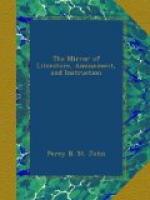picture than a solitary tree, tufted on a time-worn ruin; there
are a thousand associations in such a scene, which, to the
reflective mind, are dear as life’s-blood, and as an artist
would say, they make a fine study.
* * * * *
THE NATURALIST.
* * * * *
AMERICAN SONG BIRDS.
The Mocking-bird seems to be the prince of all song birds, being altogether unrivalled in the extent and variety of his vocal powers; and, besides the fulness and melody of his original notes, he has the faculty of imitating the notes of all other birds, from the humming-bird to the eagle. Pennant tells us that he heard a caged one, in England, imitate the mewing of a cat and the creaking of a sign in high winds. The Hon. Daines Barrington says, his pipe comes nearest to the nightingale, of any bird he ever heard. The description, however, given by Wilson, in his own inimitable manner, as far excels Pennant and Barrington as the bird excels his fellow-songsters. Wilson tells that the ease, elegance and rapidity of his movements, the animation of his eye, and the intelligence he displays in listening and laying up lessons, mark the peculiarity of his genius. His voice is full, strong, and musical, and capable of almost every modulation, from the clear mellow tones of the wood thrush to the savage scream of the bald eagle. In measure and accents he faithfully follows his originals, while in force and sweetness of expression he greatly improves upon them. In his native woods, upon a dewy morning, his song rises above every competitor, for the others seem merely as inferior accompaniments. His own notes are bold and full, and varied seemingly beyond all limits. They consist of short expressions of two, three, or at most five or six, syllables, generally expressed with great emphasis and rapidity, and continued with undiminished ardour, for half an hour or an hour at a time. While singing, he expands his wings and his tail, glistening with white, keeping time to his own music, and the buoyant gaiety of his action is no less fascinating than his song. He sweeps round with enthusiastic ecstasy, he mounts and descends as his song swells or dies away; he bounds aloft, as Bartram says, with the celerity of an arrow, as if to recover or recall his very soul, expired in the last elevated strain. A bystander might suppose that the whole feathered tribes had assembled together on a trial of skill; each striving to produce his utmost effect, so perfect are his imitations. He often deceives the sportsman, and even birds themselves are sometimes imposed upon by this admirable mimic. In confinement he loses little of the power or energy of his song. He whistles for the dog; Caesar starts up, wags his tail, and runs to meet his master. He cries like a hurt




